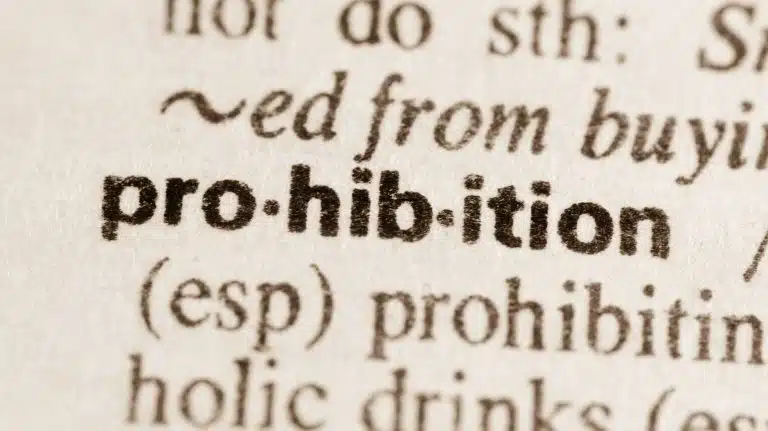When Liquor Was Illegal | Prohibition In The United States

The consumption of alcohol is a topic that can generate intense feelings and opinions. Many staunchly defend alcohol as liberty and a source of joy. Others decry it as a dangerous drug that takes the lives of far too many.
But America has experimented with banning liquor in the past. The outcome of this period, known as Prohibition, was not what anyone expected when the movement began. Today, many have drawn parallels between Prohibition and drug legalization efforts.
Early Prohibition Movements In the United States
Predominantly Protestant Christian organizations argued for state and local Prohibition measures beginning in the early 1800s.
This temperance movement spread across the United States and succeeded in establishing Prohibition laws in many different states before the American Civil War in 1861.
Shortly after the end of World War I, a leading Prohibitionist lobbying organization known as the Anti-Saloon League successfully saw the passage of the Eighteenth Amendment.
The amendment passed both chambers of the U.S. Congress in December 1917 and was ratified by three quarters of the states in January 1919.
The 18th Amendment & The Volstead Act
Section 1 of the 18th Amendment to the U.S. Constitution is as follows:
“After one year from the ratification of this article the manufacture, sale, or transportation of intoxicating liquors within, the importation thereof into, or the exportation thereof from the United States and all territory subject to the jurisdiction thereof for beverage purposes is hereby prohibited.”
But while the 18th amendment did establish a nationwide Prohibition on the alcohol industry, it did not ban alcohol consumption. It also did not establish a mechanism for enforcing the Prohibition of alcohol manufacture, sale, or transport.
This would come nine months later with the passage of the National Prohibition Act, or the Volstead Act.
This act overrode established definitions, procedures, and penalties to curtail now-illegal alcohol production, regulate the production and distribution of industrial alcohols, and create a new branch of the U.S. government, the Bureau of Prohibition, to oversee enforcement of the new law.
The Prohibition Era
Despite a tremendous effort by the Federal Government, Prohibition agents, and local law enforcement, the consumption and sale of liquor in the United States did not end.
Bootleggers
“Bootleggers” smuggled alcohol from Mexico or Canada to “speakeasies,” or illegal bars operating across the country until “moonshine” became widespread. Moonshine was produced by illegal and often small-scale distilleries in the U.S.
Millions of working-class Americans participated in this black market, and bootleg liquor sales fed the mafia and organized crime in New York City, Chicago, and other population centers large and small.
Increased Crime
Al Capone, the infamous gangster and businessman based in Chicago, is the best example.
And though Capone did eventually face justice, being convicted of income tax evasion in lieu of his other crimes, the early 20th century saw U.S. crime grow to new and disturbing heights even as the public’s perception of the benefits of Prohibition waned.
The End Of Prohibition
The repeal of Prohibition came, as they say, not with a bang, but with a whimper.
Prohibition and bootlegging had funded a massive increase in organized crime, taken the lives of tens of thousands in the ensuing violence, severely damaged the economy as a result of lost tax revenue, and only reduced the consumption of alcoholic beverages by between 30 and 50%.
Following the early days of the Great Depression, with the economy further devastated and public opinion turning dramatically in favor of legalization, both parties in congress called for the end of Prohibition.
This was a measure that would require a new constitutional amendment to undo the previous one. But this was swiftly accomplished, with the 21st amendment ratified by Dec. 5, 1933 under president Franklin D. Roosevelt, formally ending the “great experiment” that was Prohibition.
The War On Drugs
Many public health experts and commentators are quick to draw parallels between Prohibition and the ongoing War on Drugs—the increasing efforts to legalize cannabis and decriminalize other drug uses are a mirror to the conclusions drawn in the twenty-first amendment.
Now, as back then, illicit drug production fuels criminal enterprise overburdens the criminal justice system, and only limits (and even romanticizes) the scourge of substance use.
Regulation and investment in substance use treatment, these experts argue, offer a better solution to the problem of substance dependence and addiction than legal penalties.
To learn about our substance abuse treatment programs, please contact us today.
Written by Ark Behavioral Health Editorial Team
©2024 Ark National Holdings, LLC. | All Rights Reserved.
This page does not provide medical advice.
Encyclopedia Britannica - Prohibition | Definition, History, Eighteenth Amendment, & Repeal
National Public Radio (NPR) - After 50 Years Of The War On Drugs, 'What Good Is It Doing For Us?
The Atlantic - Prohibition Was a Failed Experiment in Moral Governance
Questions About Treatment?
Ark Behavioral Health offers 100% confidential substance abuse assessment and treatment placement tailored to your individual needs. Achieve long-term recovery.
100% confidential. We respect your privacy.
Prefer Texting?
Our friendly support team is here to chat 24/7. Opt out any time.







 Learn More
Learn More








